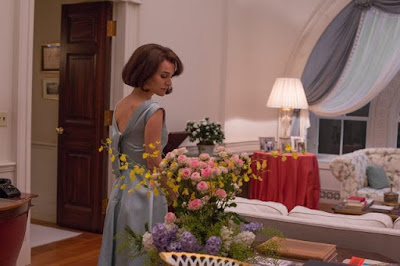Natalie Portman certainly gives herself over to the fraught and fragile emotional state of the semi-heroine character she plays in JACKIE, the second of the fantasia-type biopics that director Pablo Larraín has given us within the space of a couple of weeks (his other is Neruda, a tale of Chilean poet/politician Pablo Neruda). Ms Portman, Señor Larraín and screenwriter Noah Oppenheim (shown below) have conspired to give us an imagined time in the life of the legendary Jacqueline Bouvier Kennedy Onassis that takes place during an interview with a journalist some time after the assassination of her husband, President John F. Kennedy, who was at her side when he was killed in Dallas in November of 1963.
Fantasia this may be -- much of what we see indeed happened, but much also has been "imagined" in terms of the feelings and even the verbiage we hear from the various players in the game of politics, personalities and history that is served up here -- but it is most definitely a warts-and-all fantasia, for in Jackie the movie, Jackie the woman comes off as quite the controlling and entitled player in the charade served up here. Even so, the movie manages to includes a few highly emotional and compelling scenes -- a blood-splattered death tends to serve this purpose well -- along with a few choice and cynical moments of high humor. ("I don't smoke," our Jackie tells that journalist, after we -- and he -- have seen her puffing away on countless cigarettes.)
We're present at the swearing in of Lyndon Johnson (another good choice in John Carroll Lynch, center, right, above, with the great Beth Grant, center left, doing honors as Lady Bird). Among the many flashbacks are those with the local priest (a fine John Hurt) who counsels our heroine with, if not the usual cliches, still a bunch of religious/philosophical musings that will not exactly blow your mind.
We see that famous "White House tour" Jackie took us on via television back in the day (above), and we meet some of her entourage (in particular the very good, as ever, Greta Gerwig). And of course the assassination itself, which we come back to a time or two, to add some pizzazz to the proceedings.
There are lots of outfit changes, too -- the movie is a kind of fashion show of its day -- showing off Ms Portman to fine visual effect (the actress is a good deal more beautiful even than the original Jackie.)
It would appear to be the "interior" life of our heroine that Oppenheim, Larraín and Portman are going after, and they achieve this only to some extent. We're certainly there with Jackie as she flails then focuses, reaches out then pushes away. But all the specifics finally seem to be underscoring the obvious instead of revealing much that is new.
This is never more obvious than in the movie's resolutely pushing of the famous "Camelot" comparison -- which surfaces over and over and then ends the film. The movie is clear about the history/mythmaking goal of this Camelot nonsense. But so what? Unfortunately, it has simply added to that nonsense.
Ms Portman is as good as she is allowed to be. Thank god Larraín is a more subtle director than Darren Aronofsky, who pulled out all the stops and then invented a couple of new ones for Black Swan. Of course that won Portman her Oscar. I suspect that Jackie will prove a little too measured and even a tad too negative to garner Portman a second award. In terms of Larraín's work, this movie does not come up to the level of his Neruda, perhaps because of how deeply and well this Chilean director knows and understands that subject and personage. With Jackie, he seems to be relying more on conventional history, "imagined" though it may be.
In any case, the movie -- from Fox Searchlight and running 100 minutes -- after premiering in New York and Los Angeles a week or so back, opens across the country today, Wednesday, December 21. Here in South Florida you can find it in nearly one dozen theaters. Elsewhere? Sure. Simply click here and, if your local theaters don't pop right up, enter your zip code to find the nearest location.





































